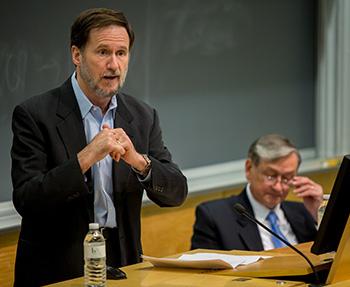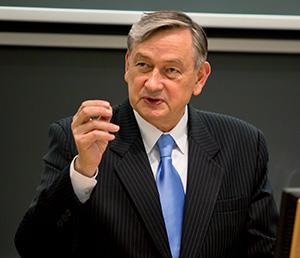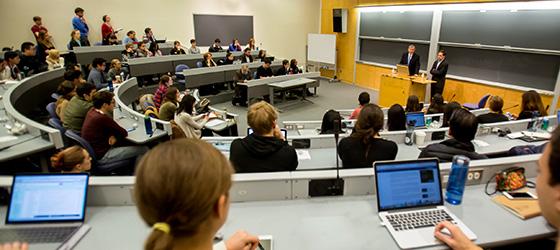The Refugee Crisis
The Global Dimensions of Europe's 'Migrant Crisis' Are Considered in a Discussion at Columbia Law School
New York, December 2, 2015—Hundreds of thousands of refugees have streamed into Europe this year, fleeing war and escaping poverty. Yet the “migrant crisis” is just the tip of a troubling international iceberg, warned Danilo Türk, the former president of Slovenia and a visiting professor at Columbia Law School, and Columbia University Professor Michael W. Doyle. The pair discussed the larger problem in a Nov. 24 presentation at Columbia Law School titled “The Refugee Crisis: Global and European Challenges.”
| Columbia Law School professor Michael Doyle, left, and visiting professor Danilo Türk, background, discuss the global scope of the European refugee crisis |
“The European Union’s crisis is part of a global crisis,” said Doyle, co-director of the Law School’s Center on Global Governance, which sponsored the event. He laid out the dimensions of the global problem before Türk offered his insights on the situation in Europe. A former U.N. assistant secretary-general for political affairs, Türk is now in the running for secretary-general.
The United Nations High Commission for Refugees puts the present number of forcibly displaced people at 60 million worldwide, the highest point since World War II. “The year 2014 saw the biggest increase in displacement on record, nearly double the level of displacement from a decade before,” Doyle said. “At the same time, the number of returns—that is, refugees going back to their country of origin—is at a 30-year low.”
Returning home remains the ideal outcome, but it’s a difficult and often-impractical goal. The average time of forced displacement now runs to about 17 years, said Doyle. More than 1.5 million Afghans who fled the Taliban two decades ago are still in Pakistan, for example, and 400,000 Somalis whose families fled their country in the 1990s live in Kenyan refugee camps.
“Another interesting statistic is that more than half of refugees are 18 or younger,” Doyle noted. “It’s a very young population globally, and that has significant implications.” He drew a bleak picture of the prospects for a 15-year-old who loses his chance at an education or skills training. “There’s a danger of a lost generation unless education and skills-building become a key part of refugee asylum.”
Bordering nations bear the brunt of an exodus, and 86 percent of refugees are now hosted in developing countries, Doyle said. “One-quarter of Lebanon’s population is refugees.
| Türk, a visiting professor and a former president of Slovenia says of the response to the crisis, "The solutions have to be global. One cannot expect a particular region to solve a problem of this magnitude." |
“Many of our responses are arguably inadequate, and yet the obligation to provide protection for refugees is general and global, by all countries for all refugees, as set forth in the [United Nations’] 1951 Convention and the 1967 Protocol,” said Doyle. “But their movement across borders today is a perilous tangle of regulations and obstacles that too often leave refugees and migrants unprotected, governments frustrated, and citizens outraged.”
According to the 1951 Convention, no one with a “well-founded fear of being persecuted for reasons of race, religion, nationality, membership of a particular social group or political opinion” can be expelled or returned to a country that threatens him or her. But, Doyle said, many asylum-seekers who’d like to claim these protections face a Catch-22: Though they can’t be expelled, they have no allowances to enter another country, and the decision of whether they qualify for refugee status can’t be made until after they reach the country where they want asylum. “So here’s an enormous, built-in invitation to move across borders without permission, often with the support of smugglers,” Doyle said. The standard of “persecution” built into the 1951 Convention also “doesn’t fit the civil wars, the gang violence, the climate-induced desertification or flooding that can drive individuals to flee.” While many countries are open to weighing different reasons for asylum, standards still vary from country to country.
Doyle closed by listing “three ideas worth consideration”: Hold the perpetrators producing refugees liable for their actions; strengthen the capacity of the U.N. to make refugee decisions; and acknowledge the “global responsibility” for refugees. “Many more countries could participate in resettlement,” he said.
“The solutions have to be global,” seconded Türk. “One cannot expect a particular region to solve a problem of this magnitude and geographic spread.”
Previous global frameworks, like the 1951 Convention, were geared to help “individualized refugee cases, not this massive exodus,” Türk said. “In Europe today, we have a large movement of people where it’s become increasingly difficult to apply legal norms which were designed for a different type of situation.
“The interesting thing here is that Europe—and in particular the European Union—was surprisingly ill-prepared for this kind of crisis,” said Türk. Shifting populations among European Union states had led the EU to “focus on what was happening within its borders without developing proper policy instruments for a potential—and, in the long run, necessary—influx of people from other parts of the world.”
A “disproportionate burden” has been placed on the countries of first entry, Türk said, but “discussions of burden sharing” are “politically unpromising” and neglect the wishes of the migrants, who want to go to places like Germany or Sweden, with generous social welfare programs. “They don’t ask for asylum in a country like Slovenia,” he said.
The European Union needs to invest to strengthen its capacity to deal with migrants, with more border officials who could properly register and direct new arrivals, “and of course the European Union needs to rethink its visa policies,” said Türk. Given the long-term need of EU countries for more people, Europe should “allow people to enter more freely,” he said.
“The European Union has been shaken very seriously by this crisis, shaken in a fundamental political sense,” Türk said. “It's created a situation in which certain countries negotiate outcomes without paying attention to the need for developing common and single European policies. Whatever happens, we in the European Union are likely to have an ever-larger number of people coming from other parts of the world. We should not underestimate the fears, and real answers have to be provided. We are in a situation where much more serious discussion is needed, and I hope that this discussion will lead to the kind of integration policies which are necessary in our time.”


